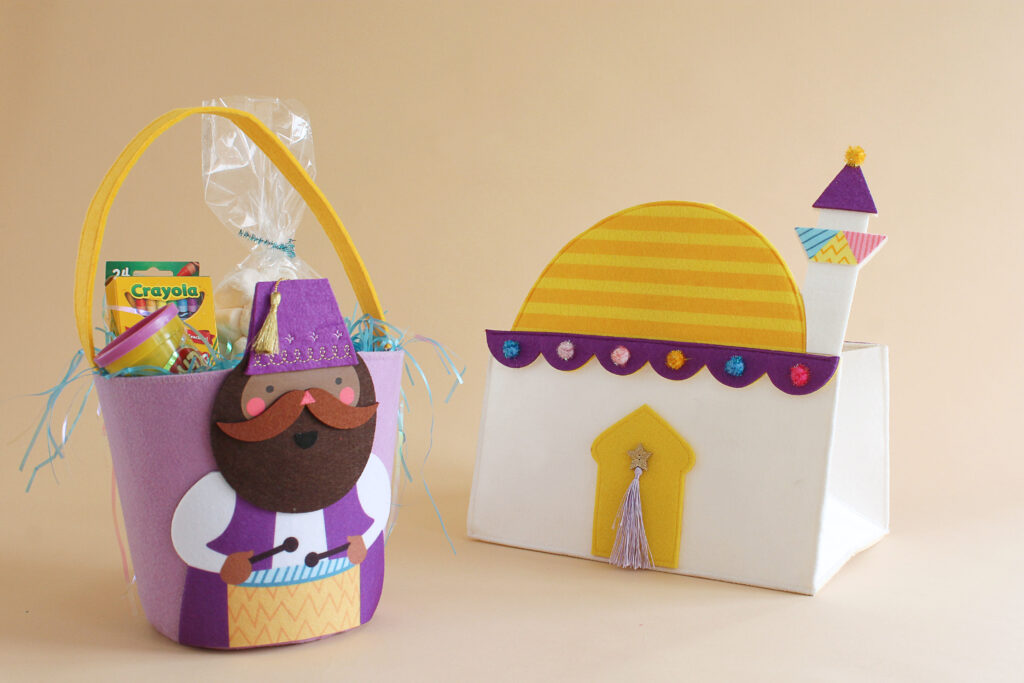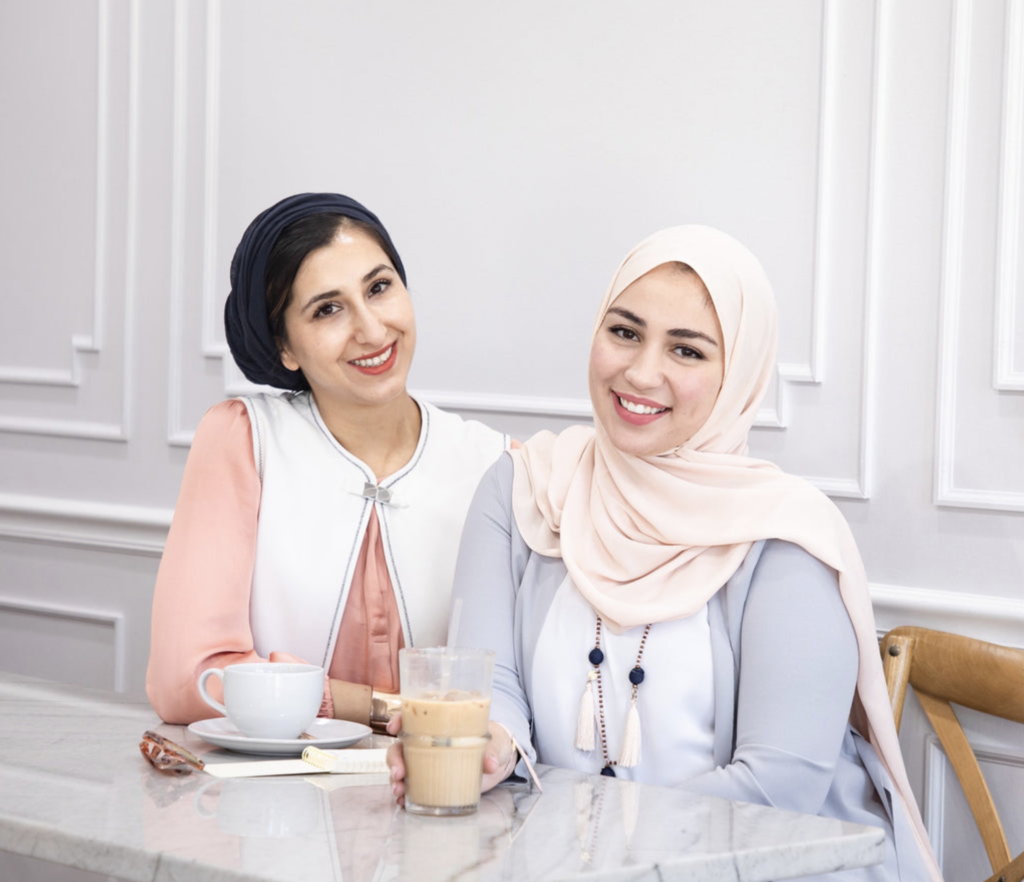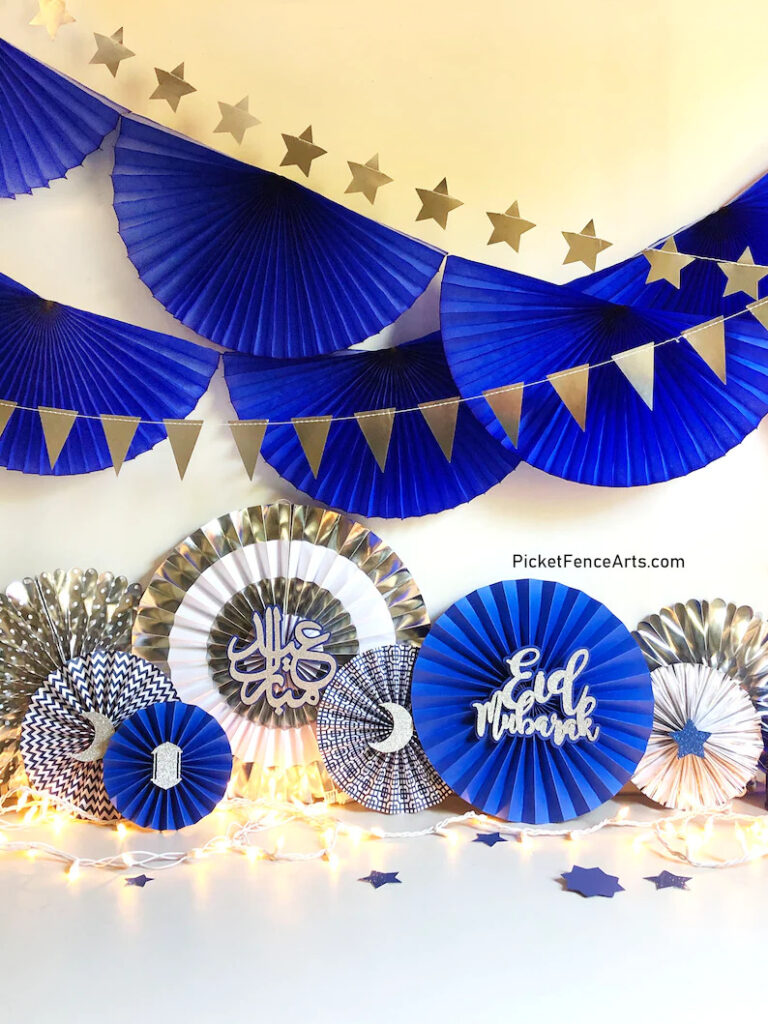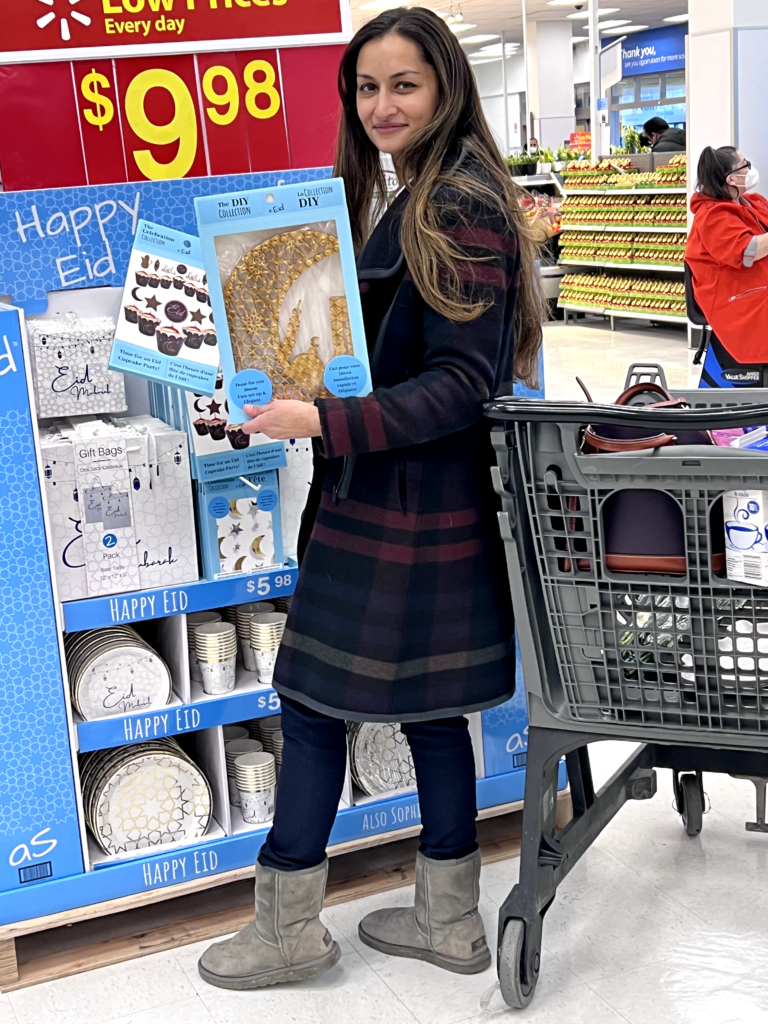Celebrating with a little crafting, color, and cute décor
By Kiran Ansari
March/April 2023
As a little girl from Ontario, Canada, Sanna Janjua used to be mesmerized by the lights and décor around the winter holidays. She used to be fascinated by the fancy gift wrap, shimmery ribbons, and glittery bows. On Eid, she and her siblings enjoyed new clothes, traditional foods, and some cash gifts, but that was about it. It never felt as festive as the other holidays celebrated in school, at the mall, on their street, and everywhere around them.
Fast forward a decade or so and today Janjua has designed her own line of meaningful heirloom-quality Ramadan and Eid décor. She knew she wasn’t the only one that felt that void. What started as a small handmade business has grown so much that she outsources manufacturing to keep up with demand.


Families want to create the same feeling as when they spruce up the home before a special guest arrives. They want to create festive vibes for the most special guest, Ramadan, that only comes once a year.
“I started my small shop in 2011 and worked on orders when my baby slept at night,” Janjua said. “But very soon I began receiving commission requests for Islamic art and started selling at Muslim events. There was much need for inclusivity when it came to Islamic lifestyle products in North America. I began sharing my journey online and experimenting with my designs. Today, Al hamdu lillah, my Ramadan Pocket Calendars and Arabic alphabet learning tools (www.designedbysanna.com) are in so many Muslim homes.”
Sophia Syed from Mississauga felt the same void — but took a different route. A physical therapist by profession, she used to dabble in creative DIY projects with her children. However, she knew many other busy mothers either don’t have the time, patience, or the skillset in making their own Ramadan and Eid décor.
“As parents raising Muslim kids in the West, we knew we had to elevate our holidays, so our children don’t wish they celebrated other events.” Syed said. “I wanted to create something that was easily accessible to all community members.”
Ramadan at Walmart
That is when she reached out to Walmart. With their large buying power and diverse customer base, she knew if something was readily available on a Walmart shelf, everyone could afford it.
“I was okay with working on thin margins because money is secondary. I was doing this with the intention of community service and social enterprise,” Syed added. “I never wanted someone who is a new immigrant to Canada, or a refugee, to feel that they cannot celebrate Ramadan.”
She launched her collection (www.alsosophia.com) in Walmart in 2020, only for it to become illegal to sell soon after. That is because the Canadian lockdown rules only allowed for essential items to be sold. However, she didn’t give up. Her products did so well the next two times, that they will be in around 120 stores in Walmart Canada this year! It takes a lot of effort to get premium retail space at the front of the store. But when pallets of product sell out, Walmart knows Muslims have the buying power.
Visibility is key in large stores. A teacher or manager may stumble upon Ramadan décor at Walmart and get it to make their student or employee feel included. They would have to take more steps to find such items otherwise. With more exposure, Muslim holidays will not seem foreign or weird when people don’t eat lunch during Ramadan or ask for Eid off.
Walmart isn’t the only big box retailer to offer Ramadan and Eid décor. Target, Crate & Barrel, and Party City have products for Muslim holidays as well. The mastermind that reached out to all three of these stores was a young blogger and entrepreneur, Manal Aman.
Straight out of university, Aman also saw the need for Muslim parents to hype up our holidays for their children. Instead of trying to produce everything herself, she created a stellar portfolio, had a presentation ready, and emailed the large companies. It may seem like a daunting task, but she had a wonderful response. She licensed her Ramadan drummer calendar to Crate & Barrel and Target has Eid greeting cards with her designs on their shelves too.
“When customers say should we support small handmade businesses or large retailers, I always say, you’re supporting Muslims either way,” Aman said. “The massive corporations don’t have much time to care for minority events. So, it is a Muslim somewhere who has pushed for this product that you see for sale today.”
In addition to the success of her creative products at big name stores, Aman has her own website (helloholydays.shop) too and regularly contributes articles about Muslim celebrations to magazines like Martha Stewart, Good Housekeeping, Woman’s Day, and Real Simple.
Suha Dweik and Saja Farrah from Tennessee shared the same vision. They started Amasi Decor in 2015 after noticing a lack of options for Muslim festivals. Their aim is to offer Ramadan and Eid décor pieces that are quick, easy, and affordable.
“We want to get our families excited about the holidays and to help them start new traditions that can be passed on to future generations,” Dweik said.



They have had such a fabulous response to their sleek product line that they have partnered with Muslim nonprofits, libraries, and schools to make Ramadan 2023 bigger and better. Their 20 new products this year (www.amasidecor.com) include craft kits, tableware, and other décor so Muslims kids can also share their holidays with their classmates, teachers, and neighbors too.
Spoiled for Choice
In 2023, no Muslim parent should say they do not know how to make their child’s first fast or Quran milestone special. From blogs and social media full of inexpensive do-it-yourself projects to readily available items, there is something for every budget and aesthetic. Some families like to invest in higher end pieces that they can reuse each year or all around the year. Others prefer economical items so they can craft up something different each time.
With so many choices, customers today don’t worry about finding items. They however sometimes are in a dilemma about whether they should support small, handmade, home-based businesses or contribute to the bottom line of a billion-dollar company.
The answer is you can do both.
“Price should not be the only qualifier,” Syed said. “Evaluate the whole experience. Walmart may offer the convenience and price point. However, a small business will package it beautifully and include a handwritten note. There is room for both kinds of business models.”
“We understand that sometimes it can feel difficult to support a smaller Muslim woman owned business because the prices are higher,” said Farrah. “But it helps to see it from the perspective of recycling the Muslim dollar.”
Hena Haque from Nevada agrees. She has been making custom paper décor for Ramadan and Eid since 2014. Even though her and other Muslim entrepreneurs’ ideas have been stolen and copied for less, she knows there will always be a market for handmade items.
“My customers understand that they are buying a handcrafted product that is not meant for single use. It can be used for years to come,” Haque said. “Not only that, but I also provide customization and a curated service. You can buy a banner from a big retailer that everyone might have, or you could pay $20 extra and get a customized one that reflects your personal style. While I understand the products might not be within everyone’s budget, I’d like the customers to think of it as an investment in good quality products that come from the heart, create less waste, and drive the creative spirit of the Muslim entrepreneur.”
For instance, her best seller is her Ramadan and Eid fan décor set. Every year she releases a new color palette (www.picketfencearts.etsy.com). Her customers love how she pairs prints, textures, and unique themes, such as her “Olive and Moon” collection.
When you purchase from a mother who is raising a family but at the same time providing high quality handmade products, you are helping her pursue her dreams. It might be her way to save for Hajj or pay for her childrens swim lessons. However, if we do not buy from the Targets and Walmarts, they will stop selling the items. And we will miss seeing that sparkle in our child’s eye when they see Ramadan décor as they help you pick up eggs and milk.
“I view Islamic products in the mainstream as a good thing because that’s what we wanted as Muslims living in the West” said Janjua. “It creates a sense of belonging for our kids whether we purchase the items or not.”
A Word of Caution
There will always be some who raise eyebrows that Ramadan décor is not part of Islam or may even be considered an innovation. To them, these superwomen — and their loyal customers — say it is all about intention. When Muslim parents make a big deal about Ramadan and Eid, it should be with the niyyah of making their children fall in love more with their faith and our holidays. Our special times of the year should bring our kids so much joy that they never feel like they are missing out on Halloween or Valentine’s Day.
There will be others that say Muslims are going down the slippery slope of commercialization like other faiths. However, when the primary intention is to bring children closer to Islam, families can pick décor options that reinforce the deen. Dry erase prayer trackers, sunnah-a-day calendars, padded colorful kid prayer rugs, Quran talking pens that help with tajweed, washable Arabic letter placemats, magnets to memorize duas – the list is endless. And that is a wonderful thing.
The goal should never be to compete with the “perfect” Muslim family you see on Instagram or down the street. The Eid gifts should never put a family in credit card debt. But it doesn’t have to be all or nothing.
There is no need for cutthroat competition within the Muslim community because there is room for everyone. Customers that want a premium handmade experience can shop on Etsy, for instance. And those who want an inexpensive last-minute fix can drive to Party City. The end objective is the same.
Families can strike a balance. With the right intention, they can raise their kids looking forward to our holidays. Supply them with books about Prophets, duas to memorize, activities to do, masjid puzzles to make and charity boxes to fill. Have a budget, and then buy a little from both big and small businesses. “In the end the most important thing I try to remember is that our rizq (sustenance) is written by Ar-Razzaq (God — the Ultimate Provider),” Janjua concluded. “And therefore, what is meant for us will reach us. We just need to have the right intention and put in the hard work.”
Kiran Ansari is a mother and small business owner in suburban Chicago. She has been trying to make Ramadan & Eid special for her children for the past two decades and has no plans of stopping soon.
Tell us what you thought by joining our Facebook community. You can also send comments and story pitches to [email protected]. Islamic Horizons does not publish unsolicited material.
